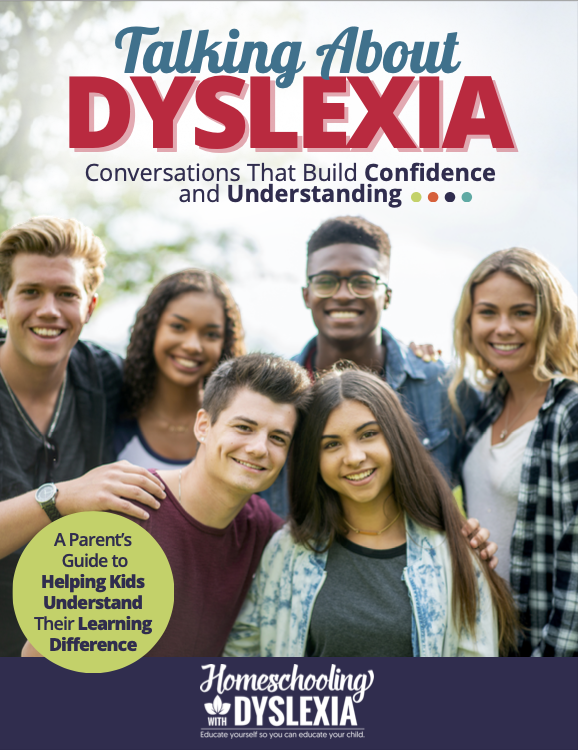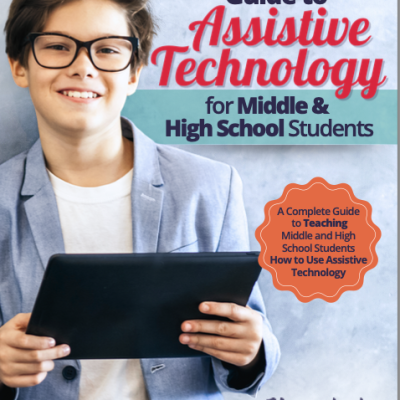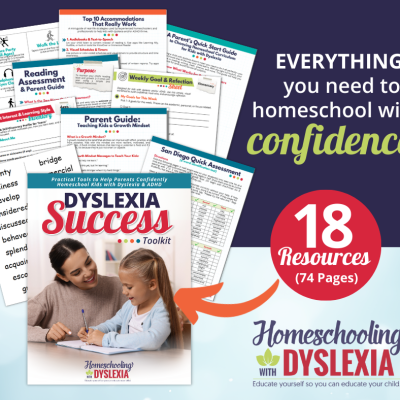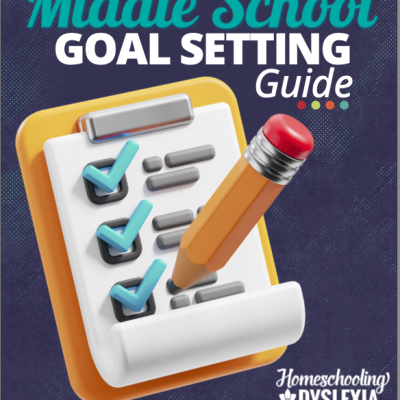Parents Guide to Talking to Kids About Dyslexia
Original price was: $12.00.$7.00Current price is: $7.00.
Talking About Dyslexia: Conversations That Build Confidence and Understanding is a practical, parent-friendly guide designed to help you talk with your child about dyslexia in a way that builds self-understanding, strength, and hope.
Created with homeschoolers and families of children who learn differently in mind, this 23-page downloadable PDF takes you step-by-step through how to approach the conversation at different developmental stages—elementary, middle school, and high school—while giving you the language, mindset, and tools to underline that dyslexia is not a limitation but a different way of thinking.
What’s Inside
Here’s what you get when you download this guide:
- Section 1: What Parents Need to Know — Clear, compassionate explanation of what dyslexia is, what it is not, how it affects reading/spelling, how it often overlaps with ADHD, and what this means for your child’s learning journey.
- Section 2: Talking to Your Elementary-Age Child — Advice on how to explain dyslexia simply, affirm your child’s intelligence, highlight strengths, and respond when your child is asked “Why can’t you read that?” or “Why did you spell that wrong?”
- Section 3: Talking to Your Middle Schooler — Guidance for helping tweens understand the wiring of their brain, advocate for themselves, embrace their unique learning style, and respond to peer comparisons.
- Section 4: Talking to Your High Schooler — Exactly what teens need: working toward adulthood, understanding that dyslexia is lifelong but manageable, learning the tools and rights (e.g., accommodations, assistive tech), and reframing dyslexia as a strength.
Section 5: Final Thoughts for Parents — A closing section reminding you that talking about dyslexia isn’t a one-time conversation but a lifelong one, helping you keep the dialogue open and supportive.
Bonus Printable Worksheets
Famous Dyslexics and Their Strengths with Discussion Prompts
Dyslexia Awareness and Reflection Sheets
-
- Elementary
- Middle School
- High School
Dyslexia Strengths Inventories
- Elementary
- Middle School
- High School
Self-Advocacy Practice Sheets
- Elementary
- Middle School
- High School
CHRISTIAN ADD-ON: God’s Design and Purpose (Optional Supplement for Christian Families)
Why Parents of Kids with Dyslexia & ADHD Will Love It
- It’s stage-specific, so you don’t get generic advice – you get language and tools that match your child’s age and mindset.
- It reframes the story: the guide emphasizes that dyslexia is not about low intelligence or laziness, but different wiring + unique strengths.
- It gives you practical tools — not just theory — like what to say when your child is embarrassed, how to talk to others, how to build self-advocacy, and how to identify and lean into strengths.
- It supports your homeschooling context (or any context, really) by giving you ready-to-use discussion prompts and worksheets that you can print and work through together.
Who This Is For
- Homeschooling parents of children with dyslexia (and often ADHD) who want to start or deepen the conversation about differences in learning.
- Parents who want to equip their kids at each stage (elementary, middle, high school) with self-understanding, language, and self-advocacy skills.
- Educators, tutors, or coaches working with children who learn differently who want a ready resource for parent-child dialogue.
- Any parent who wants to move from a “remediation only” mindset to a strengths-based, positive mindset with their child.
How to Use the Guide
- Download the PDF and print it (or view on a tablet) before scheduling a talk with your child.
- Begin with the section that matches your child’s current age/development. Read through the suggested language and pick prompts/dialogue you feel comfortable with.
- Consider printing and using the bonus worksheets (reflection sheets, strength inventories, self-advocacy prompts) together with your child.
- Use it as a conversation starter and reference: come back to it periodically (especially as your child transitions from elementary to middle school, and from middle to high school) to revisit language, goals, and supports.
- Integrate it into your homeschool or tutoring environment: share it with your child’s tutor or co-op so everyone uses similar language and supportive strategies.
Why This Guide Was Created
As you know, the journey of homeschooling children with dyslexia (and often ADHD) is one filled with unique challenges—and profound opportunities. With 30 + years of experience and 8 children (7 of whom learn differently), I know that one of the least addressed but most powerful elements in this journey is the conversation: how we talk about dyslexia, how our children internalize what it means to learn differently, and the language we use to frame learning, strength, struggle and success.
If you’re ready to help your child — no matter their age — embrace their unique brain wiring, understand their learning difference, and step confidently forward into success, then download Talking About Dyslexia today. One simple conversation (and the follow-up tools) can shift the narrative from “I’m behind” to “I learn differently and that’s my advantage.”





Reviews
There are no reviews yet.